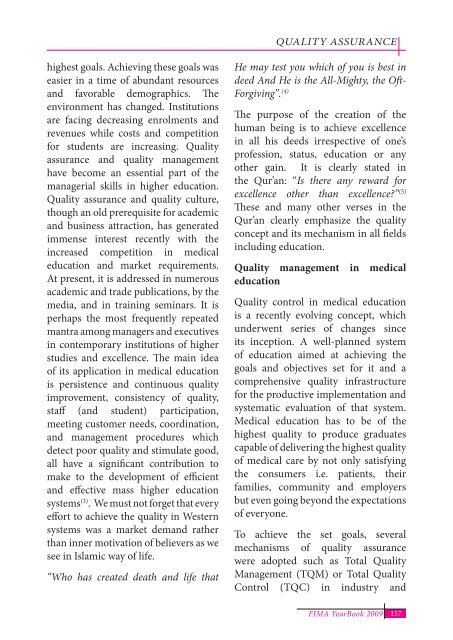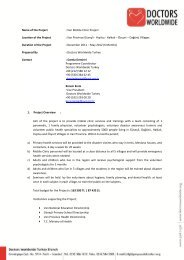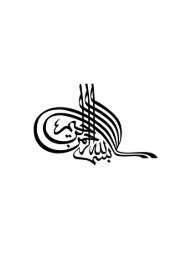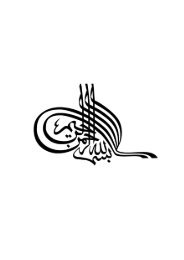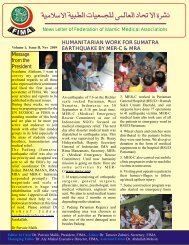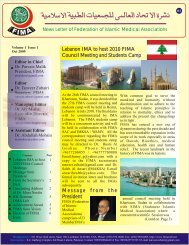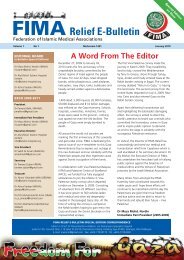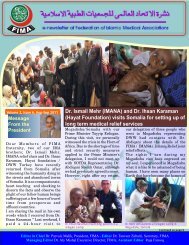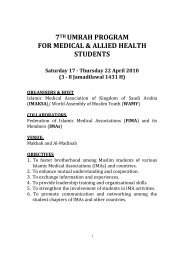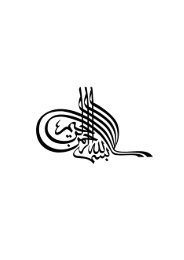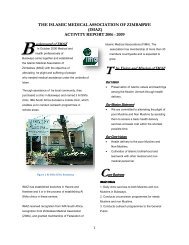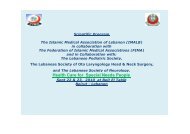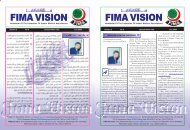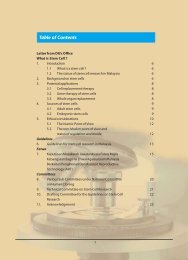FIMA Year Book 2009 - Federation of Islamic Medical Associations
FIMA Year Book 2009 - Federation of Islamic Medical Associations
FIMA Year Book 2009 - Federation of Islamic Medical Associations
You also want an ePaper? Increase the reach of your titles
YUMPU automatically turns print PDFs into web optimized ePapers that Google loves.
Quality Assurancehighest goals. Achieving these goals waseasier in a time <strong>of</strong> abundant resourcesand favorable demographics. Theenvironment has changed. Institutionsare facing decreasing enrolments andrevenues while costs and competitionfor students are increasing. Qualityassurance and quality managementhave become an essential part <strong>of</strong> themanagerial skills in higher education.Quality assurance and quality culture,though an old prerequisite for academicand business attraction, has generatedimmense interest recently with theincreased competition in medicaleducation and market requirements.At present, it is addressed in numerousacademic and trade publications, by themedia, and in training seminars. It isperhaps the most frequently repeatedmantra among managers and executivesin contemporary institutions <strong>of</strong> higherstudies and excellence. The main idea<strong>of</strong> its application in medical educationis persistence and continuous qualityimprovement, consistency <strong>of</strong> quality,staff (and student) participation,meeting customer needs, coordination,and management procedures whichdetect poor quality and stimulate good,all have a significant contribution tomake to the development <strong>of</strong> efficientand effective mass higher educationsystems (3) . We must not forget that everyeffort to achieve the quality in Westernsystems was a market demand ratherthan inner motivation <strong>of</strong> believers as wesee in <strong>Islamic</strong> way <strong>of</strong> life.“Who has created death and life thatHe may test you which <strong>of</strong> you is best indeed And He is the All-Mighty, the Oft-Forgiving”. (4)The purpose <strong>of</strong> the creation <strong>of</strong> thehuman being is to achieve excellencein all his deeds irrespective <strong>of</strong> one’spr<strong>of</strong>ession, status, education or anyother gain. It is clearly stated inthe Qur’an: “Is there any reward forexcellence other than excellence?” (5)These and many other verses in theQur’an clearly emphasize the qualityconcept and its mechanism in all fieldsincluding education.Quality management in medicaleducationQuality control in medical educationis a recently evolving concept, whichunderwent series <strong>of</strong> changes sinceits inception. A well-planned system<strong>of</strong> education aimed at achieving thegoals and objectives set for it and acomprehensive quality infrastructurefor the productive implementation andsystematic evaluation <strong>of</strong> that system.<strong>Medical</strong> education has to be <strong>of</strong> thehighest quality to produce graduatescapable <strong>of</strong> delivering the highest quality<strong>of</strong> medical care by not only satisfyingthe consumers i.e. patients, theirfamilies, community and employersbut even going beyond the expectations<strong>of</strong> everyone.To achieve the set goals, severalmechanisms <strong>of</strong> quality assurancewere adopted such as Total QualityManagement (TQM) or Total QualityControl (TQC) in industry and<strong>FIMA</strong> <strong>Year</strong><strong>Book</strong> <strong>2009</strong>157


